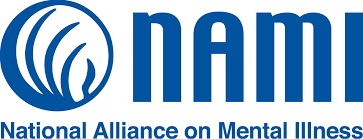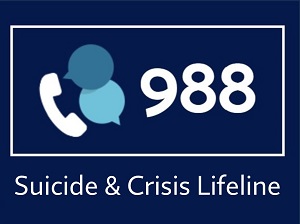Mental Health Disability
An umbrella of conditions that affect a person’s thinking, feeling, behavior, mood, or emotional well-being.
Common mental health conditions include anxiety, depression, OCD, personality disorders, and PTSD, among many others. See their definitions below.
Need to talk?
The 988 Lifeline is a national network of local crisis centers that provide free, 24/7 confidential support for people in distress, prevention, or crisis resources.
Call or text 988 or visit 988Lifeline.org to learn more.
Mental Health Conditions
A group of related conditions that pose persistent, excessive fear or worry in situations that are not threatening.
The most common types of anxiety disorders include social anxiety disorder, panic disorder, and phobias.
Learn more about anxiety disorders, treatment options, and support strategies from the National Alliance on Mental Illness.
A condition which is characterized by inattention, hyperactivity and impulsivity.
Learn more about ADHD, treatment options, and support strategies from the National Alliance on Mental Illness.
View resources related specifically to ADHD.
A disorder that causes dramatic shifts in a person’s mood, energy and ability to think clearly. People with bipolar experience high and low moods—known as mania and depression—which differ from the typical ups-and-downs most people experience.
Learn more about bipolar disorder, treatment options, and support strategies from the National Alliance on Mental Illness.
A condition characterized by difficulties regulating emotion that can lead to impulsivity, poor self-image, and intense emotional responses to stressors, as well as dangerous behavior such as self-harm.
Learn more about borderline personality disorder, treatment options, and support strategies from the National Alliance on Mental Illness.
Depression, or depressive disorder, causes extended episodes of symptoms that include agitation, fatigue, loss of interest in activities, low self-worth, and difficulty concentrating, among others.
Learn more about depressive disorders, treatment options, and support strategies from the National Alliance on Mental Illness.
Disorders characterized by an involuntary escape from reality characterized by a disconnection between thoughts, identity, consciousness and memory, and usually develop as a response to trauma. Symptoms of dissociative disorders include significant memory loss of specific times or events, out-of-body experiences, a sense of detachment from emotions, lack of self-identity, and other mental health conditions.
Learn more about dissociative disorders, treatment options, and support strategies from the National Alliance on Mental Illness.
A group of related conditions that cause serious emotional and physical problems involving extremes with food and weight. These conditions include anorexia nervosa, bulimia nervosa, and binge eating disorder, in which each have behaviors and symptoms that are separate from the others.
Learn more about eating disorders, treatment options, and support strategies from the National Alliance on Mental Illness.
OCD is characterized by repetitive, unwanted, intrusive thoughts (obsessions) and irrational, excessive urges to do certain actions (compulsions) that generally last more than an hour each day and interfere with daily life.
Learn more about obsessive-compulsive disorder, treatment options, and support strategies from the National Alliance on Mental Illness.
A result of a traumatic event that has a lasting effect on a person’s mental health with symptoms including re-occurring memories, avoidance, cognitive and mood changes, and heightened arousal/hypervigilance.
Learn more about PTSD, treatment options, and support strategies from the National Alliance on Mental Illness.
A complex, long-term mental illness that interferes with a person’s ability to think clearly, manage emotions, make decisions and relate to others. Initial signs of schizophrenia can include common/nonspecific behaviors such as irritability, isolation or withdrawal, and an increase in unusual thoughts or suspicions. Diagnosable symptoms include hallucinations, delusions, negative symptoms (diminishment of a person’s abilities), and cognitive issues such as disorganized thinking and anosognosia (lack of insight), that cause reduced functioning for a least 6 months.
Learn more about schizophrenia, treatment options, and support strategies from the National Alliance on Mental Illness.
Resources

The National Alliance on Mental Illness is the largest grassroots mental health organization in the nation. The alliance includes more than 700 NAMI State Organizations and Affiliates who work in your community to raise awareness and provide support and education to those in need.
NAMI HelpLine is available M-F, 10 a.m. – 10 p.m. ET | Call 800-950-6264, text “helpline” to 62640, or chat online. In a crisis, call or text 988 (24/7).
Visit NAMI.org to learn more.

The 988 Suicide & Crisis Lifeline is a national network of local crisis centers that provides free and confidential emotional support to people in suicidal crisis or emotional distress 24 hours a day, 7 days a week in the United States. We’re committed to improving crisis services and advancing suicide prevention by empowering individuals, advancing professional best practices, and building awareness.
Visit 988Lifeline.org to learn more about mental health, seek assistance, or find out how you can get involved for suicide prevention.
For immediate assistance 24/7:
Call or text 988
Chat with the Lifeline online
Deaf or HoH using TTY – dial 711 + 988 or ASL users call “988 Videophone”
Chat with the Veterans Crisis Line or text 838255
Remember: You are not alone. Don’t hesitate to reach out if you’re experiencing thoughts of suicide.

